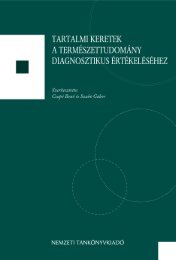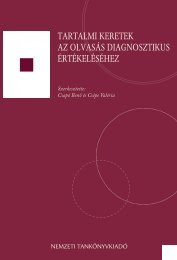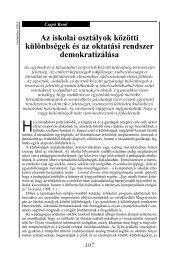- Page 2 and 3:
Tartalmi kereteka matematika diagno
- Page 4 and 5:
Diagnosztikus mérések fejlesztés
- Page 7:
TartalomBevezetés (Csapó Benő é
- Page 10 and 11:
Csapó Benő és Szendrei Máriazá
- Page 12 and 13:
Csapó Benő és Szendrei Máriafej
- Page 14 and 15:
Csapó Benő és Szendrei Máriaés
- Page 17 and 18:
1.A matematikai gondolkodásfejlesz
- Page 20 and 21:
Terezinha Nunes és Csapó Benőjü
- Page 22 and 23:
Terezinha Nunes és Csapó Benőgye
- Page 24 and 25:
Terezinha Nunes és Csapó Benősz
- Page 26 and 27:
Terezinha Nunes és Csapó Benő(2)
- Page 28 and 29:
Terezinha Nunes és Csapó Benőtan
- Page 30 and 31:
Terezinha Nunes és Csapó Benőnyo
- Page 32 and 33:
Terezinha Nunes és Csapó Benőpro
- Page 34 and 35:
Terezinha Nunes és Csapó Benőrel
- Page 36 and 37:
Terezinha Nunes és Csapó Benőele
- Page 38 and 39:
Terezinha Nunes és Csapó BenőMul
- Page 40 and 41:
Terezinha Nunes és Csapó Benőtá
- Page 42 and 43:
Terezinha Nunes és Csapó Benőzó
- Page 44 and 45:
Terezinha Nunes és Csapó Benőasp
- Page 46 and 47:
Terezinha Nunes és Csapó Benőmeg
- Page 48 and 49:
Terezinha Nunes és Csapó Benőző
- Page 50 and 51:
Terezinha Nunes és Csapó BenőA k
- Page 52 and 53:
Terezinha Nunes és Csapó BenőA m
- Page 54 and 55:
Terezinha Nunes és Csapó Benőala
- Page 56 and 57:
Terezinha Nunes és Csapó BenőKá
- Page 59 and 60:
2.A matematikai műveltségés a ma
- Page 61 and 62:
2. A matematikai műveltség és a
- Page 63 and 64:
2. A matematikai műveltség és a
- Page 65 and 66:
2. A matematikai műveltség és a
- Page 67 and 68:
2. A matematikai műveltség és a
- Page 69 and 70:
2. A matematikai műveltség és a
- Page 71 and 72:
2. A matematikai műveltség és a
- Page 73 and 74:
2. A matematikai műveltség és a
- Page 75 and 76:
2. A matematikai műveltség és a
- Page 77 and 78:
2. A matematikai műveltség és a
- Page 79 and 80:
2. A matematikai műveltség és a
- Page 81 and 82:
2. A matematikai műveltség és a
- Page 83 and 84:
2. A matematikai műveltség és a
- Page 85 and 86:
2. A matematikai műveltség és a
- Page 87 and 88:
2. A matematikai műveltség és a
- Page 89 and 90:
2. A matematikai műveltség és a
- Page 91 and 92:
2. A matematikai műveltség és a
- Page 93 and 94:
2. A matematikai műveltség és a
- Page 95 and 96:
2. A matematikai műveltség és a
- Page 97:
2. A matematikai műveltség és a
- Page 100 and 101:
Szendrei Julianna és Szendrei Már
- Page 102 and 103:
Szendrei Julianna és Szendrei Már
- Page 104 and 105:
Szendrei Julianna és Szendrei Már
- Page 106 and 107:
Szendrei Julianna és Szendrei Már
- Page 108 and 109:
Szendrei Julianna és Szendrei Már
- Page 110 and 111:
Szendrei Julianna és Szendrei Már
- Page 112 and 113:
Szendrei Julianna és Szendrei Már
- Page 114 and 115:
Szendrei Julianna és Szendrei Már
- Page 116 and 117:
Szendrei Julianna és Szendrei Már
- Page 118 and 119: Szendrei Julianna és Szendrei Már
- Page 120 and 121: Szendrei Julianna és Szendrei Már
- Page 122 and 123: Szendrei Julianna és Szendrei Már
- Page 124 and 125: Szendrei Julianna és Szendrei Már
- Page 126 and 127: Szendrei Julianna és Szendrei Már
- Page 128 and 129: Szendrei Julianna és Szendrei Már
- Page 130 and 131: Szendrei Julianna és Szendrei Már
- Page 132 and 133: Szendrei Julianna és Szendrei Már
- Page 134 and 135: Szendrei Julianna és Szendrei Már
- Page 136 and 137: Szendrei Julianna és Szendrei Már
- Page 138 and 139: Szendrei Julianna és Szendrei Már
- Page 141 and 142: 4.A diagnosztikus matematika méré
- Page 143 and 144: 4. A diagnosztikus matematika mér
- Page 145 and 146: 4. A diagnosztikus matematika mér
- Page 147 and 148: 4. A diagnosztikus matematika mér
- Page 149 and 150: 4. A diagnosztikus matematika mér
- Page 151 and 152: 4. A diagnosztikus matematika mér
- Page 153 and 154: 4. A diagnosztikus matematika mér
- Page 155 and 156: 4. A diagnosztikus matematika mér
- Page 157 and 158: 4. A diagnosztikus matematika mér
- Page 159 and 160: 4. A diagnosztikus matematika mér
- Page 161 and 162: 4. A diagnosztikus matematika mér
- Page 163 and 164: 4. A diagnosztikus matematika mér
- Page 165 and 166: 4. A diagnosztikus matematika mér
- Page 167: 4. A diagnosztikus matematika mér
- Page 172 and 173: A matematikai képességekdiagnoszt
- Page 174 and 175: Csíkos Csaba, Gábri Katalin, Lajo
- Page 176 and 177: Csíkos Csaba, Gábri Katalin, Lajo
- Page 178 and 179: Csíkos Csaba, Gábri Katalin, Lajo
- Page 180 and 181: Csíkos Csaba, Gábri Katalin, Lajo
- Page 182 and 183: Csíkos Csaba, Gábri Katalin, Lajo
- Page 184 and 185: Csíkos Csaba, Gábri Katalin, Lajo
- Page 186 and 187: Csíkos Csaba, Gábri Katalin, Lajo
- Page 188 and 189: Csíkos Csaba, Gábri Katalin, Lajo
- Page 190 and 191: Csíkos Csaba, Gábri Katalin, Lajo
- Page 192 and 193: Csíkos Csaba, Gábri Katalin, Lajo
- Page 194 and 195: Csíkos Csaba, Gábri Katalin, Lajo
- Page 196 and 197: Csíkos Csaba, Gábri Katalin, Lajo
- Page 198 and 199: Csíkos Csaba, Gábri Katalin, Lajo
- Page 200 and 201: Csíkos Csaba, Gábri Katalin, Lajo
- Page 202 and 203: Csíkos Csaba, Gábri Katalin, Lajo
- Page 204 and 205: Csíkos Csaba, Gábri Katalin, Lajo
- Page 206 and 207: A matematikai tudás alkalmazásán
- Page 208 and 209: Csíkos Csaba, Gábri Katalin, Lajo
- Page 210 and 211: Csíkos Csaba, Gábri Katalin, Lajo
- Page 212 and 213: Csíkos Csaba, Gábri Katalin, Lajo
- Page 214 and 215: Csíkos Csaba, Gábri Katalin, Lajo
- Page 216 and 217: Csíkos Csaba, Gábri Katalin, Lajo
- Page 218 and 219:
Csíkos Csaba, Gábri Katalin, Lajo
- Page 220 and 221:
Csíkos Csaba, Gábri Katalin, Lajo
- Page 222 and 223:
Csíkos Csaba, Gábri Katalin, Lajo
- Page 224 and 225:
Csíkos Csaba, Gábri Katalin, Lajo
- Page 226 and 227:
Csíkos Csaba, Gábri Katalin, Lajo
- Page 228 and 229:
Csíkos Csaba, Gábri Katalin, Lajo
- Page 230 and 231:
Csíkos Csaba, Gábri Katalin, Lajo
- Page 232 and 233:
Csíkos Csaba, Gábri Katalin, Lajo
- Page 234 and 235:
Csíkos Csaba, Gábri Katalin, Lajo
- Page 236 and 237:
Csíkos Csaba, Gábri Katalin, Lajo
- Page 238 and 239:
Csíkos Csaba, Gábri Katalin, Lajo
- Page 240 and 241:
Csíkos Csaba, Gábri Katalin, Lajo
- Page 242 and 243:
Csíkos Csaba, Gábri Katalin, Lajo
- Page 244 and 245:
Csíkos Csaba, Gábri Katalin, Lajo
- Page 246 and 247:
Csíkos Csaba, Gábri Katalin, Lajo
- Page 248 and 249:
Csíkos Csaba, Gábri Katalin, Lajo
- Page 250 and 251:
Csíkos Csaba, Gábri Katalin, Lajo
- Page 252 and 253:
Csíkos Csaba, Gábri Katalin, Lajo
- Page 254 and 255:
Csíkos Csaba, Gábri Katalin, Lajo
- Page 256 and 257:
Csíkos Csaba, Gábri Katalin, Lajo
- Page 258 and 259:
Csíkos Csaba, Gábri Katalin, Lajo
- Page 260 and 261:
Csíkos Csaba, Gábri Katalin, Lajo
- Page 262 and 263:
Csíkos Csaba, Gábri Katalin, Lajo
- Page 264 and 265:
Csíkos Csaba, Gábri Katalin, Lajo
- Page 266 and 267:
Csíkos Csaba, Gábri Katalin, Lajo
- Page 268 and 269:
Csíkos Csaba, Gábri Katalin, Lajo
- Page 270 and 271:
Csíkos Csaba, Gábri Katalin, Lajo
- Page 272 and 273:
A matematikatudás tartalmi terüle
- Page 274 and 275:
Csíkos Csaba, Gábri Katalin, Lajo
- Page 276 and 277:
Csíkos Csaba, Gábri Katalin, Lajo
- Page 278 and 279:
Csíkos Csaba, Gábri Katalin, Lajo
- Page 280 and 281:
Csíkos Csaba, Gábri Katalin, Lajo
- Page 282 and 283:
Csíkos Csaba, Gábri Katalin, Lajo
- Page 284 and 285:
Csíkos Csaba, Gábri Katalin, Lajo
- Page 286 and 287:
Csíkos Csaba, Gábri Katalin, Lajo
- Page 288 and 289:
Csíkos Csaba, Gábri Katalin, Lajo
- Page 290 and 291:
Csíkos Csaba, Gábri Katalin, Lajo
- Page 292 and 293:
Csíkos Csaba, Gábri Katalin, Lajo
- Page 294 and 295:
Csíkos Csaba, Gábri Katalin, Lajo
- Page 296 and 297:
Csíkos Csaba, Gábri Katalin, Lajo
- Page 298 and 299:
Csíkos Csaba, Gábri Katalin, Lajo
- Page 300 and 301:
Csíkos Csaba, Gábri Katalin, Lajo
- Page 302 and 303:
Csíkos Csaba, Gábri Katalin, Lajo
- Page 304 and 305:
Csíkos Csaba, Gábri Katalin, Lajo
- Page 306 and 307:
Csíkos Csaba, Gábri Katalin, Lajo
- Page 308 and 309:
Csíkos Csaba, Gábri Katalin, Lajo
- Page 310 and 311:
Csíkos Csaba, Gábri Katalin, Lajo
- Page 312 and 313:
Csíkos Csaba, Gábri Katalin, Lajo
- Page 314 and 315:
Csíkos Csaba, Gábri Katalin, Lajo
- Page 316 and 317:
Csíkos Csaba, Gábri Katalin, Lajo
- Page 318 and 319:
Csíkos Csaba, Gábri Katalin, Lajo
- Page 320 and 321:
Csíkos Csaba, Gábri Katalin, Lajo
- Page 322 and 323:
Csíkos Csaba, Gábri Katalin, Lajo
- Page 324 and 325:
Csíkos Csaba, Gábri Katalin, Lajo
- Page 326 and 327:
Csíkos Csaba, Gábri Katalin, Lajo
- Page 328 and 329:
Csíkos Csaba, Gábri Katalin, Lajo
- Page 330 and 331:
A kötet szerzőigondozójaként r
- Page 332:
A kötet szerzőiLieven Verschaffel


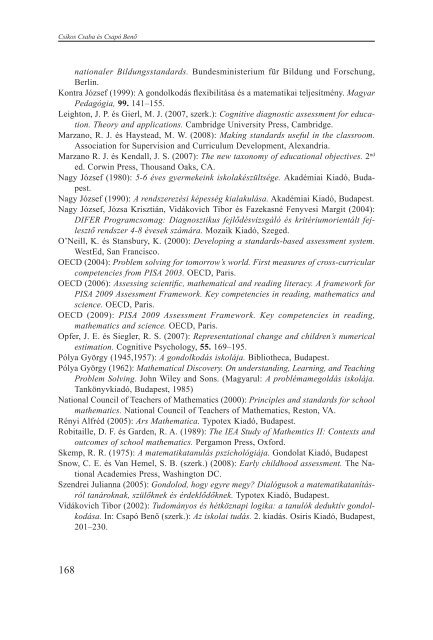
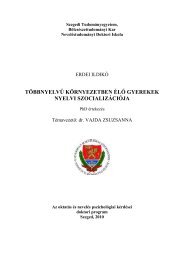
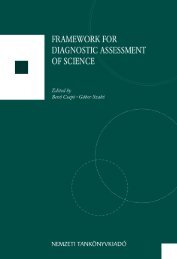
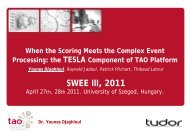
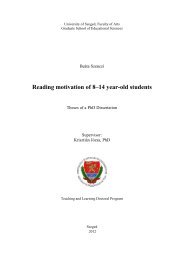

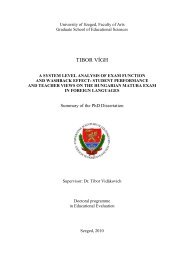
![Download [PDF] - Diagnosztikus Mérések Fejlesztése](https://img.yumpu.com/38928685/1/177x260/download-pdf-diagnosztikus-macracsek-fejlesztacse.jpg?quality=85)
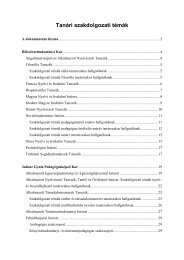
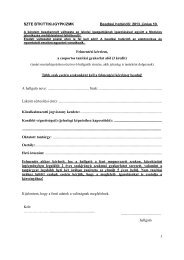
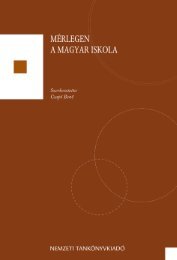
![Download [PDF] - Diagnosztikus Mérések Fejlesztése](https://img.yumpu.com/38928622/1/180x260/download-pdf-diagnosztikus-macracsek-fejlesztacse.jpg?quality=85)
